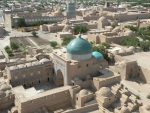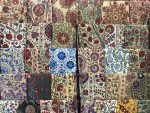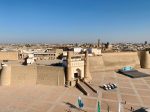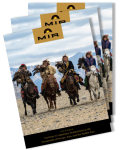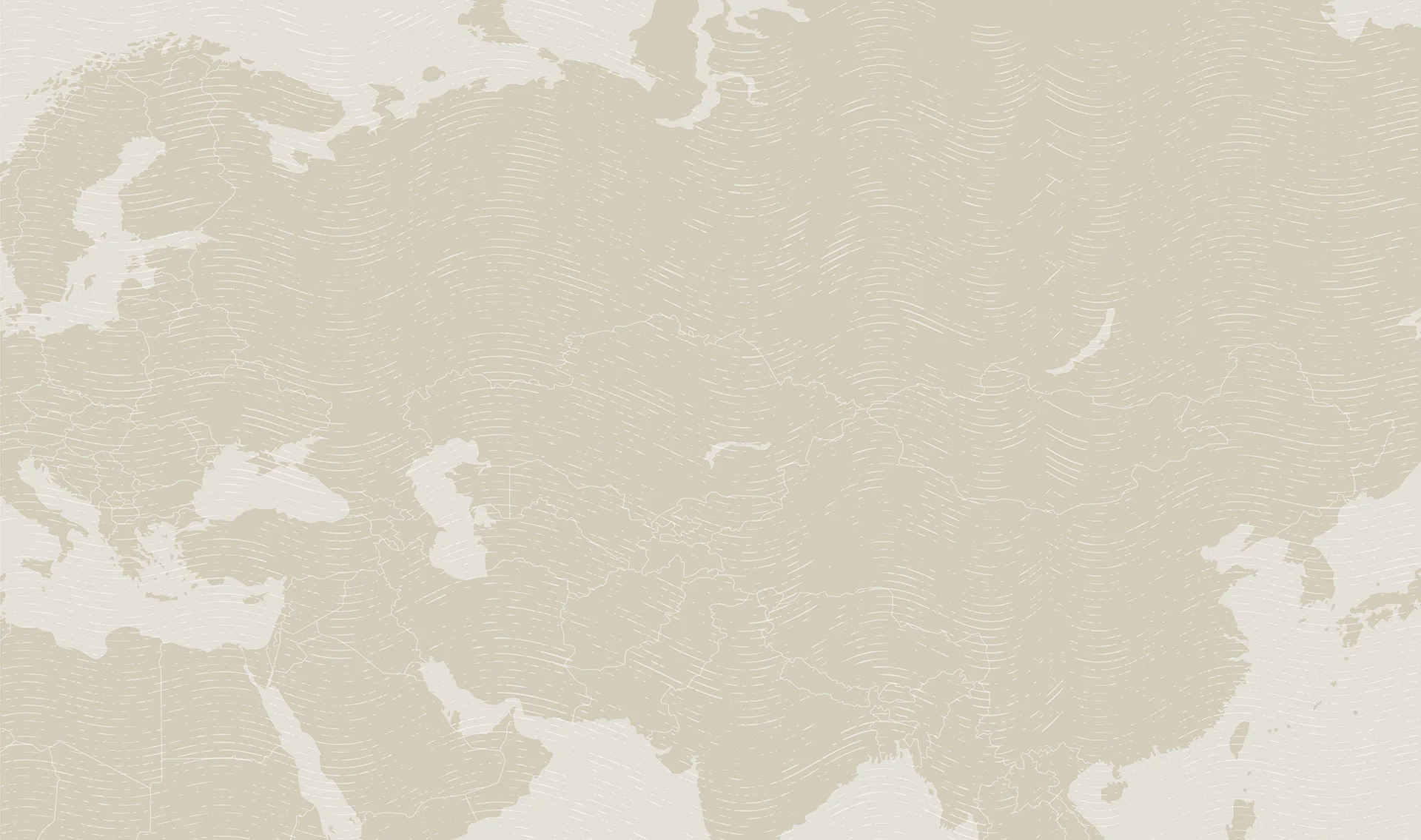Outposts of the Silk Road
Photo credit: Jake Smith
An Expedition Through Kyrgyzstan and Uzbekistan
Overview
Follow in the footsteps of ancient caravans on this modern Silk Road journey from the Kyrgyz mountains at the border of China to the UNESCO-listed Silk Road oases of Khiva, Bukhara, and Samarkand that dot the deserts of Uzbekistan. Delve into the past and discover the history, architecture and culture that combine to make this route as captivating today as in antiquity. Along the way, explore Tash Rabat, a timeworn caravanserai scenically situated in the Tien Shan Mountains; linger in the high-altitude pastures around Lake Song Kul, where herders set up yurts and tend their yaks and horses through the summer; see Uzbekistan’s mud brick and blue-tiled masterpieces, and stroll its bazaars celebrated for silks, ceramics, fruit and spices.
Travels to: Kyrgyzstan, Uzbekistan

Map

Itinerary
-
Days 1-4: Bishkek (Kyrgyzstan), Chong Kemin

Start in Kyrgyzstan’s capital, Bishkek, where visits to museums, the city’s main bazaar, and a textile-designer’s workshop serve as an introduction to Kyrgyz culture. Then drive to a traditional village in Chong Kemin and get immersed in the life of the countryside, sharing meals with locals and taking part in daily rituals.
HIGHLIGHTS
- Visiting Bishkek’s State Museum of Fine Arts, featuring Kyrgyz art and handicrafts
- Marveling at the sights and smells of Osh Bazaar, with its fruits, nuts, prepared foods, and brilliant Kyrgyz textiles
- Taking a master class in silk scarf-making
- Climbing to the top of Burana Tower, one of the few remaining Silk Road watchtowers in Kyrgyzstan
- Seeing a yurt raised – a process so distinctive and well engineered that it’s on the UNESCO List of Intangible Cultural Heritage
-
Days 5-7: Naryn, Tash Rabat, Song Kul Lake

Drive up to the mountain town of Naryn, stopping in Kochkor on the way to watch a demonstration of felt-making – a centuries-old craft that’s falling out of common practice. Explore the well-preserved 15th century Tash Rabat caravanserai, a former highland outpost on the Silk Road that’s Central Asia’s largest stone structure. Continue on to Song Kul, a high-altitude lake surrounded by verdant pastures and snow-capped mountains.
HIGHLIGHTS
- Watching a demonstration of traditional eagle hunting and learning how Kyrgyzstan’s famous felt rugs are made in Kochkor
- Visiting the ancient stone Silk Road caravanserai at Tash Rabat, high in the Kyrgyz mountains
- Touring Tash Rabat, a giant stone fortress and Silk Road caravanserai filled with underground passages and secret exits
- Getting to know a semi-nomadic family and learning about their lifestyle at their yurt camp near the shores of high-altitude Song Kul
- Attending an exciting game of kokboru near Song Kul, a remarkably beautiful backdrop to this fascinating horseback sport
-
Days 8-11: Toktogul, Osh, Fergana Valley (Uzbekistan)

Head down from the mountains along a winding a scenic road over two days, overnighting in the remote town of Toktogul along the way. Enter the Fergana Valley at Osh, Kyrgyzstan’s main town in the valley. After exploring there cross the border to Uzbekistan side of the valley – the country’s heartland. Spend two days learning about the crafts, culture, and history that make this region so special.
HIGHLIGHTS
- Being astounded by the sensory overload of Osh’s fabulous Jayma Bazaar
- Pondering the legacy of Babur, founder of the Mughal dynasty, as you gaze out across the valley from atop Solomon’s Throne – a hill in Osh
- Learning about the life and work of local artisans during visits to both ceramics and silk workshops in the rural Fergana Valley
- Discovering the history of the Khanate of Kokand, one of the three main political entitites in Central Asia prior to the arrival of the Russian Empire, as you explore its remnants in the moderrn town of Kokand
-
Days 12-14: Khiva, Bukhara

Drive from the Fergana Valley to Tashkent and then board a flight to Khiva, Uzbekistan’s farthest flung Silk Road Outpost, laying across the Kyzyl Kum Desert. Spend two nights there exploring the city’s compact and well-preserved old town. Then head out overland across the desert to Bukhara, a walkable and atmospheric town with some of Uzbekistan’s most astounding architecture.
HIGHLIGHTS
- Wandering the streets of Khiva, a remote desert town with an intact and compact center that possesses an exotic feel
- Crossing the Kyzyl Kum Desert overland – a journey taken by caravans since time immemorial – as you head from Khiva to Bukhara and Samarkand, taking in all three UNESCO-listed Silk Road oases in Uzbekistan
- Experience the timeless character of Bukhara’s Old Town with its winding streets and colorful markets
- Visiting a cooperative in a village near Bukhara where suzanis, traditional silk-on-cotton embroidery are made by hand
-
Days 15-18: Samarkand, Tashkent

From Bukhara take a high-speed train to the next Silk Road oasis, Samarkand. Samarkand is home several dramatic examples of monumental Timurid architecture, some of the most iconic and frequently photographed structures in the Islamic world. Spend some time here getting to know the city and its people before you back to Tashkent by another high-speed train. The journey concludes in Tashkent.
HIGHLIGHTS
- Admiring the majesty of the Registan and explore the architectural wonders of legendary Samarkand
- Learning how bread, silk carpets, and paper are made using traditional methods while visiting three different artisans in Samarkand
- Seeing the impressive 15th-century mausoleum of Amir Timur (Tamerlane) – the founder of the Timurid dynasty
Dates & Prices
Small group tour – max 12 travelers
Land tour price, per person. Based on double occupancy and minimum group size of 5 travelers.
What is a Partial Single Supplement?
This tour connects to our Pamir Highway tour: Tajikistan’s Pamir Highway, August 17-31, 2024.
-
2025 Dates
July 30 - Aug 16Tour, double occupancy$6,495Plus internal airfare$200Partial single supplement$850
-
2026 Dates
July 29 - Aug 15Tour, double occupancy$6,495Plus internal airfare$200Partial single supplement$850
What's Included
-
Tour Includes
- Accommodations as noted in itinerary. Yurts are utilized for the night spent at Song Kul Lake (shared sleeping accommodations, outhouse-style WC facilities). Other nights will be spent at 3-4-star hotels and guesthouses.
- Most meals, as noted in the itinerary: 18 breakfasts, 16 lunches and 15 dinners.
- Restaurant tips for included meals.
- Services of experienced, English-speaking local guides, drivers and other staff, including a MIR Tour Manager.
- Arrival/departure airport transfers. MIR will arrange for all travelers to be met on arrival and seen off on departure whether we make your airfare arrangements or not, provided you arrive and depart on the tour start/end dates in the tour start/end cities.
- Ground transportation throughout itinerary by private mini-coach, jeep or van (size of vehicle depends on group size and terrain and will vary from country to country).
- Guided sightseeing tours and entrance fees as outlined in itinerary.
- Gratuities to local guides, drivers, porters and other service personnel.
- Complete pre-departure electronic document that includes detailed packing suggestions, reading list links, country-specific information, maps, travel tips and more.
- Customized visa application and instruction kit (please note, visa fees are not included in the tour price).
- Electronic final update bulletin, with any late news, updates and important information.
-
Not Included
- International airfare or taxes/fuel surcharges.
- Meals not specified as included in the itinerary.
- Single supplement charge, if requested or required.
- Items of a personal nature (phone calls, email, laundry, alcohol, excess baggage, etc).
- Visa/passport fees, airport departure fees.
- Expenses incurred as a result of delay, modification or extension of a tour due to causes beyond MIR’s control.
- Baggage handling.
- Gratuities to Tour Manager.
- Travel and trip cancellation insurance.
Activity Level
-
Level 4: Rigorous
Level 4: Rigorous
This intentionally adventuresome (due to the nature of the destination) small group tour features challenging overland travel on steep, rough, single-lane mountainous roads using 4WD vehicles; and rustic accommodations, some without electricity or indoor plumbing (the two nights in a yurt at Song Kul Lake). There are long days walking and standing while touring, a border crossing on foot while carrying/rolling your own luggage, unpaved sidewalks and streets, uneven surfaces and steps, absent handrails, significant stair-climbing, and absence of elevators. Only those very fit to travel and who are willing to accept local standards of amenities and services, and the physical challenges, should consider joining this program.
Conditions are expected to be particularly challenging in the high altitude regions of Kyrgyzstan, especially the day trip to Tash Rabat and the two overnights at Song Kul Lake. Those with a history of medical problems, particularly cardiac or respiratory, must consult a doctor before considering this trip. We strongly encourage you to speak with us about any questions you may have regarding the rigors of this trip or destination when considering this tour.
Travelers must be able to walk at least two miles a day (with some hiking), keeping up with fellow travelers on a variety of terrain including through villages, on dirt paths, and the like. Some drives in steep, mountainous conditions with poor-quality roads at high elevation and without guardrails may last as long as 7-9 hours driving time (with comfort stops). A large part of the trip is at high elevations ranging from 7,000 ft to over 10,000 ft (the highest points on the itinerary are Tash Rabat and Song Kul Lake). Electricity is not a reliable constant throughout the itinerary. If you rely on electricity for CPAP (continuous positive airway pressure), or for any other reason, you must have your own battery or other back-up, or please reconsider participation. In some places, established public restrooms will be Eastern-style. In other places where there are no restrooms, the group will make “bush stops.”
One night is spent in a yurt/tent camp in Song Kul, Kyrgyzstan with camp-like facilities and no indoor plumbing; yurts are shared among several group members. Yurts can be cold at night, and hot water and/or showers are often unavailable.
The border crossing may require walking up to about a half-mile while managing baggage, and bags may need to be carried rather than rolled, as the road/sidewalk surface is not always paved or smooth. Some attractions are only accessible via steep staircases with tall uneven steps, and some of the sites may involve steep steps inside narrow passageways with limited light. Elevators are not available at touring sites, nor at a few of the hotels. Air conditioning is a luxury and often not available in facilities outside the capitals and larger towns.
Other challenges include overall shortcomings in the tourism infrastructure of these developing destinations, including some that can cause walking challenges such as unpaved sidewalks, uneven surfaces and steps, packed-dirt streets, broken pavement (streets or sidewalks), and a general absence of handrails or ramps. Past travelers have also encountered challenges with plumbing, bureaucratic service, variety of locally available foods, and availability and quality of public restrooms.



